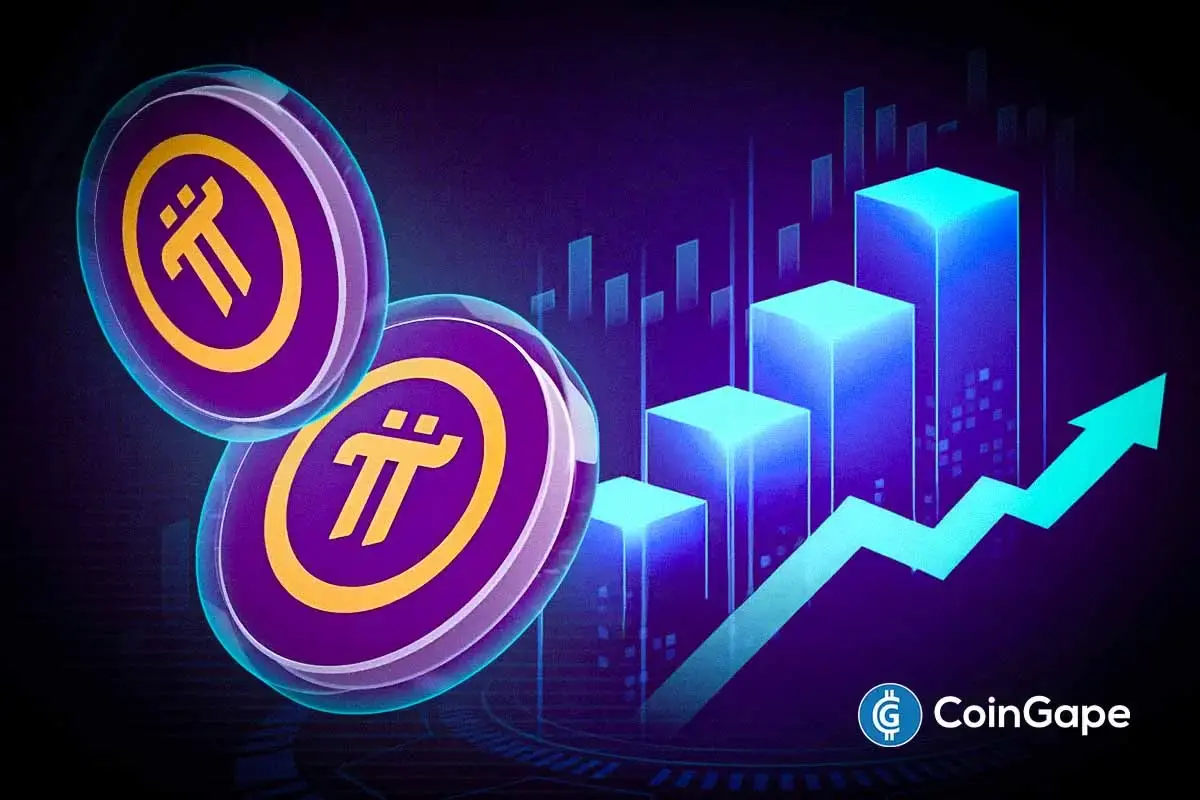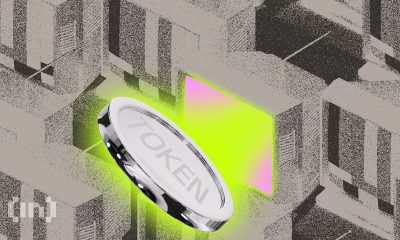Market
Meme Coins Set for Comeback as AI Tokens Lose Momentum

The crypto market may be due for another narrative shift as meme coins prepare for a potential resurgence, while AI agent tokens continue to see declining interest.
AI agents took the stage in late 2024, sidestepping meme coins as analysts shifted their gaze to altcoins with real-world value rather than speculative assets.
AI Tokens Decline, Meme Coins Poised for Resurgence
Recent data from Dune reveals that only 6-7 AI agent tokens are being created daily on Virtual, a staggering 99.5% drop from their peak in December last year. The sharp decline reflects waning enthusiasm for AI agent tokens, even as the broader AI narrative remains a dominant theme in the market.
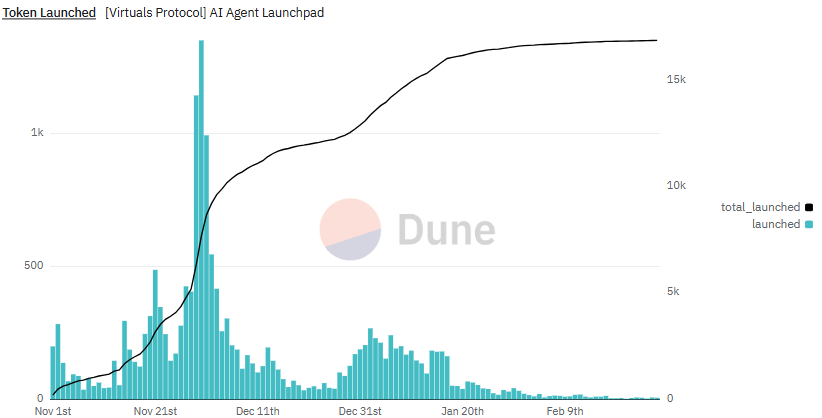
Despite this downturn, some analysts remain optimistic about the long-term potential of AI-powered crypto projects. As BeInCrypto reported, new AI agent launches show mixed signals, with some sectors seeing renewed activity.
Specifically, some, such as VIRTUAL, AI16Z, and AIXBT, have experienced gains in the last seven days. Meanwhile, others are still in a downtrend, like FAI, down 28%, and TRAC, down 19%.
Amidst these mixed signals, data on Cookie.fun shows the total market cap of crypto AI agent coins has dropped to $6.95 billion. None of the AI agent tokens has surpassed $1 billion individually on market cap metrics.
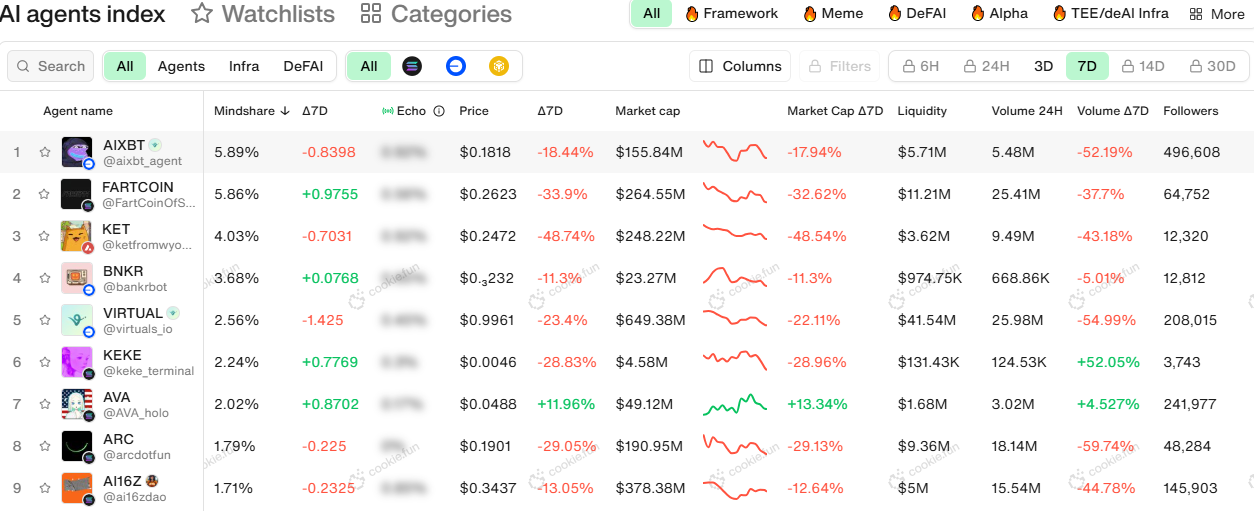
Industry experts have also highlighted how AI agents are poised to transform the workplace, further cementing artificial intelligence’s role in the digital economy. However, the recent slump in AI token creation suggests immediate market demand has cooled.
Meanwhile, the meme coin sector is experiencing its upheaval. Solana-based token launchpad Pump.fun, has been removed from the top 10 highest revenue-generating protocols in the last 24 hours.
“Pump.fun gets kicked out of the top 10 highest revenue-generating protocols in the last 24 hours as the number of bonded meme coins is plummeting to zero,” SOL ecosysten commentary The Solana Post noted.
Yet, meme coins might not remain in the shadows for long. AI mindshare, which hit over 70% last month, has since dropped to 32%, indicating a shift in market focus.
Why Meme Coins May Be Primed For Recovery
With the US SEC (Securities and Exchange Commission) recently announcing that meme coins are not classified as securities, industry participants anticipate a revival in the sector’s trading activity.
“SEC just officially ruled meme coins are not securities. This is about to bring massive on-chain volume. The trenches are about to get wild,” wrote Lynk, a popular user on X.
According to the user, Solana (SOL) could benefit from the prospective meme coin comeback. This assumption is based on the sector’s heft of Solana-based meme coins. The logic is that if meme coins stage recovery, traders and speculators would pour liquidity into the ecosystem, buying SOL to participate in launches on Pump.fun. This would potentially increase SOL’s demand and, in turn, its price.
Meanwhile, the SEC’s stance on meme coins represents a significant development for the sector. As BeInCrypto highlighted, the ruling removes a key regulatory uncertainty that has weighed on speculative tokens. The move is expected to encourage a fresh wave of meme coin projects and speculative trading, potentially bringing back the fervor seen in previous cycles.
Furthermore, the dYdX Foundation CEO Charles D’Haussy commented on the future of meme coins under Donald Trump. He acknowledged their impact on the crypto market and the broader financial ecosystem.
“I think they [meme coins] are a very good tool for people to show their interest, to show their support. I can imagine that in the future, people will buy meme coins, and they will not be called meme coins anymore,” D’Haussy told BeInCrypto.
As Bitcoin teases with a bear cycle, the divergence between AI agents and meme coins highlights shifting investor sentiment. While AI agents still command significant mindshare, their market dominance has weakened, potentially allowing meme coins to reclaim the spotlight.
The regulatory clarity provided by the SEC could catalyze increased meme coin activity. For now, however, the crypto market remains in flux.
Disclaimer
In adherence to the Trust Project guidelines, BeInCrypto is committed to unbiased, transparent reporting. This news article aims to provide accurate, timely information. However, readers are advised to verify facts independently and consult with a professional before making any decisions based on this content. Please note that our Terms and Conditions, Privacy Policy, and Disclaimers have been updated.
Market
Bitcoin Price Breakout In Progress—Momentum Builds Above Resistance

Reason to trust

Strict editorial policy that focuses on accuracy, relevance, and impartiality
Created by industry experts and meticulously reviewed
The highest standards in reporting and publishing
Strict editorial policy that focuses on accuracy, relevance, and impartiality
Morbi pretium leo et nisl aliquam mollis. Quisque arcu lorem, ultricies quis pellentesque nec, ullamcorper eu odio.
Bitcoin price is slowly moving higher above the $86,500 zone. BTC is gaining pace and might continue higher in the near term.
- Bitcoin found support at $84,200 and started a recovery wave.
- The price is trading above $85,500 and the 100 hourly Simple moving average.
- There was a break above a connecting bearish trend line with resistance at $85,000 on the hourly chart of the BTC/USD pair (data feed from Kraken).
- The pair could start another increase if it clears the $88,000 zone.
Bitcoin Price Eyes Steady Increase
Bitcoin price remained stable above the $83,200 level and started a fresh increase. BTC was able to climb above the $84,200 and $85,000 resistance levels.
There was a break above a connecting bearish trend line with resistance at $85,000 on the hourly chart of the BTC/USD pair. The bulls were able to pump the price above the $86,500 resistance. It even spiked above $87,000. A high is formed near $87,562 and the price might continue to rise unless there is a move below the 23.6% Fib retracement level of the upward move from the $84,007 swing low to the $87,562 high.
Bitcoin price is now trading above $86,500 and the 100 hourly Simple moving average. On the upside, immediate resistance is near the $87,500 level. The first key resistance is near the $88,000 level.
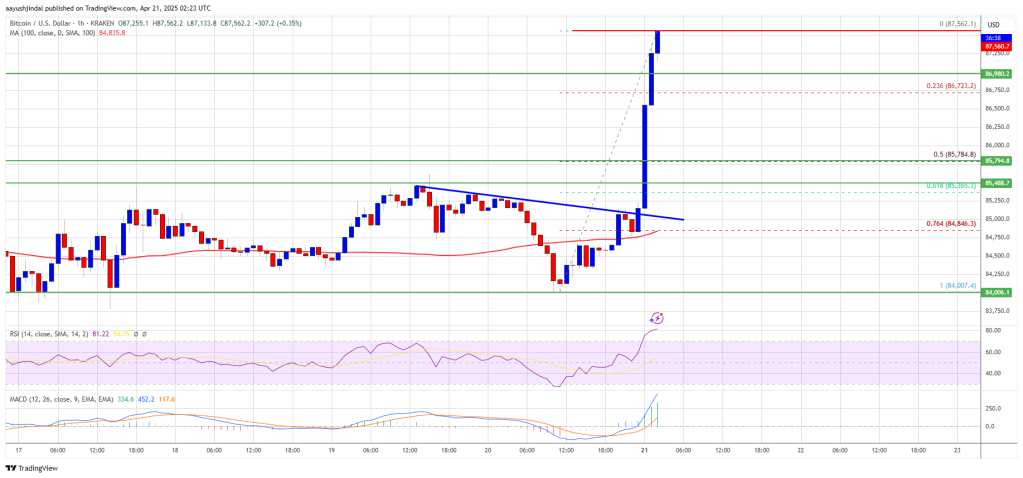
The next key resistance could be $88,800. A close above the $88,800 resistance might send the price further higher. In the stated case, the price could rise and test the $89,500 resistance level. Any more gains might send the price toward the $90,000 level.
Downside Correction In BTC?
If Bitcoin fails to rise above the $88,000 resistance zone, it could start a downside correction. Immediate support on the downside is near the $87,000 level. The first major support is near the $86,750 level.
The next support is now near the $86,000 zone. Any more losses might send the price toward the $85,750 support or the 50% Fib retracement level of the upward move from the $84,007 swing low to the $87,562 high in the near term. The main support sits at $84,850.
Technical indicators:
Hourly MACD – The MACD is now gaining pace in the bullish zone.
Hourly RSI (Relative Strength Index) – The RSI for BTC/USD is now above the 50 level.
Major Support Levels – $86,750, followed by $86,000.
Major Resistance Levels – $87,500 and $88,000.
Market
Will XRP Break Support and Drop Below $2?

XRP is down 5% over the past week, struggling to regain momentum as technical indicators flash mixed signals. Its Relative Strength Index (RSI) has dropped below 50, and the price remains stuck within a tight range between key support and resistance levels.
At the same time, the Ichimoku Cloud has shifted from green to red, with a thickening cloud ahead suggesting growing bearish pressure. With volatility compressing and momentum fading, XRP is nearing a critical point where a breakout—or breakdown—seems increasingly likely.
XRP Struggles to Regain Momentum as RSI Drops Below 50
XRP’s Relative Strength Index (RSI) is currently sitting at 44.54, after recovering from an intraday low of 40.67. Just yesterday, it was at 51.30, highlighting increased short-term volatility.
RSI is a momentum indicator that measures the speed and magnitude of recent price changes to evaluate overbought or oversold conditions.
Readings above 70 typically suggest an asset is overbought, while readings below 30 indicate it may be oversold.

With XRP’s RSI at 44.54, it’s currently in neutral territory, showing neither strong buying nor selling pressure.
However, the fact that it hasn’t crossed the overbought threshold of 70 since March 19—over a month ago—signals a lack of sustained bullish momentum. This could mean XRP is still in a consolidation phase, with the market waiting for a clearer direction.
If RSI continues to climb toward 50 and beyond, it may hint at building momentum, but without a breakout above 70, upside could remain limited.
XRP Faces Uncertainty as Bearish Trend Begins to Expand
XRP is currently trading inside the Ichimoku Cloud, signaling market indecision and a neutral trend.
The Tenkan-sen (blue line) has crossed below the Kijun-sen (red line), which is a bearish signal, but with the price still within the cloud, it lacks full confirmation.
The cloud itself acts as a zone of support and resistance, and XRP is now moving sideways within that zone.
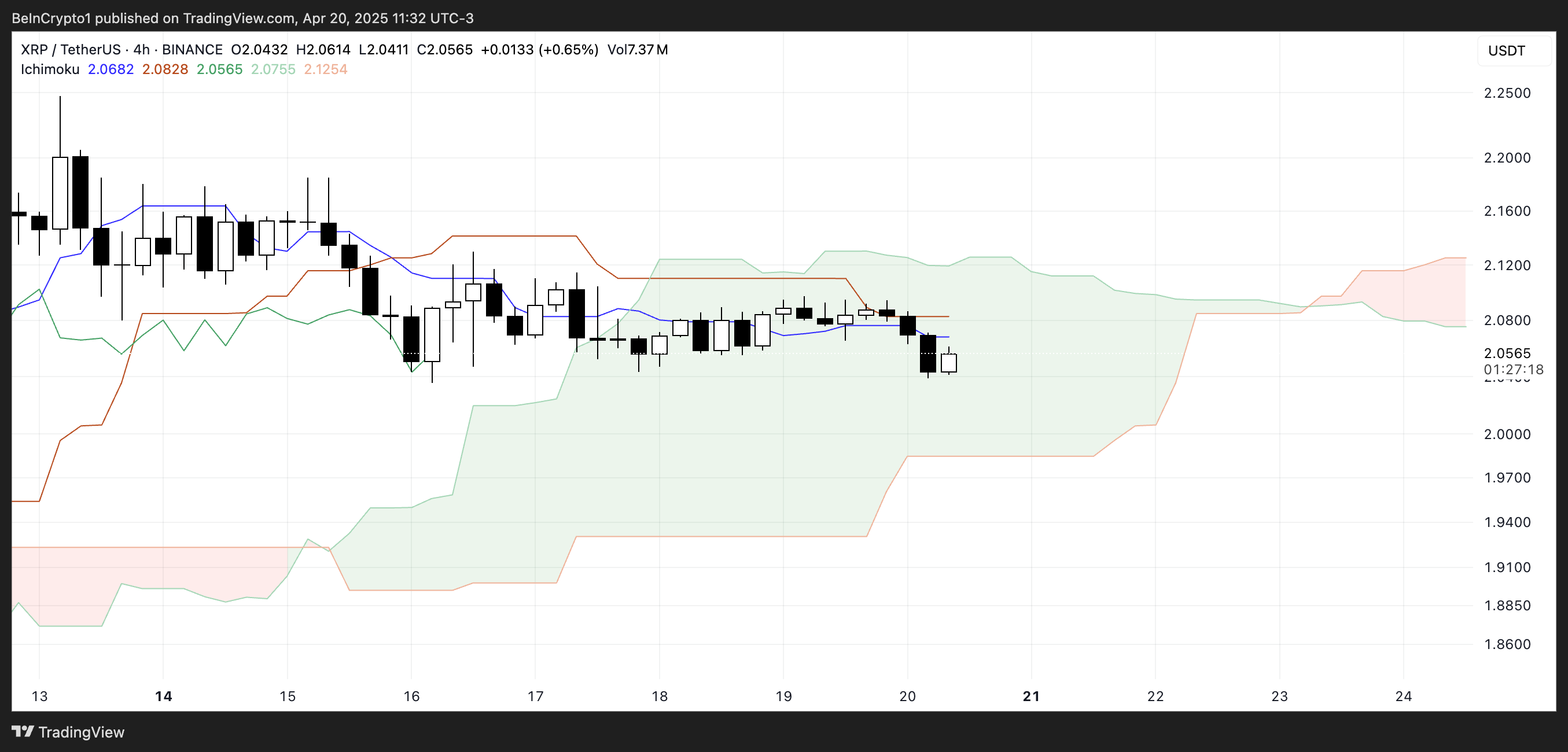
Looking ahead, the cloud has shifted from green to red—a sign that bearish momentum may be building. Even more concerning is that the red cloud is widening, which suggests increasing downward pressure in the near future.
A thickening red Kumo often signals stronger resistance overhead and a potential continuation of a bearish trend if the price breaks below the cloud.
Until XRP breaks out decisively in either direction, the market remains in a wait-and-see phase, but the growing red cloud tilts the bias toward caution.
XRP Compression Zone: A Breakout Could Send Price to $2.50 — Or Much Lower
XRP price is currently trading within a tight range, caught between a key support level at $2.05 and resistance at $2.09. This narrow channel reflects short-term uncertainty, but a decisive move in either direction could set the tone for what’s next.
If the $2.05 support fails, the next level to watch is $1.96. A break below that could trigger a steep drop toward $1.61, which would mark the first close below $1.70 since November 2024—a bearish signal that could accelerate selling pressure.
Recently, veteran analyst Peter Brandt warned that a major correction could hit XRP soon.

On the flip side, if bulls regain control and push XRP above the $2.09 resistance, the next target lies at $2.17. A breakout beyond that could open the door to a move toward $2.50, a price level not seen since March 19.
For that to happen, XRP would need a clear resurgence in momentum and buying volume.
Until then, the price remains trapped in a narrow zone, with both upside and downside potential on the table.
Disclaimer
In line with the Trust Project guidelines, this price analysis article is for informational purposes only and should not be considered financial or investment advice. BeInCrypto is committed to accurate, unbiased reporting, but market conditions are subject to change without notice. Always conduct your own research and consult with a professional before making any financial decisions. Please note that our Terms and Conditions, Privacy Policy, and Disclaimers have been updated.
Market
Dogecoin Defies Bullish Bets During Dogeday Celebration
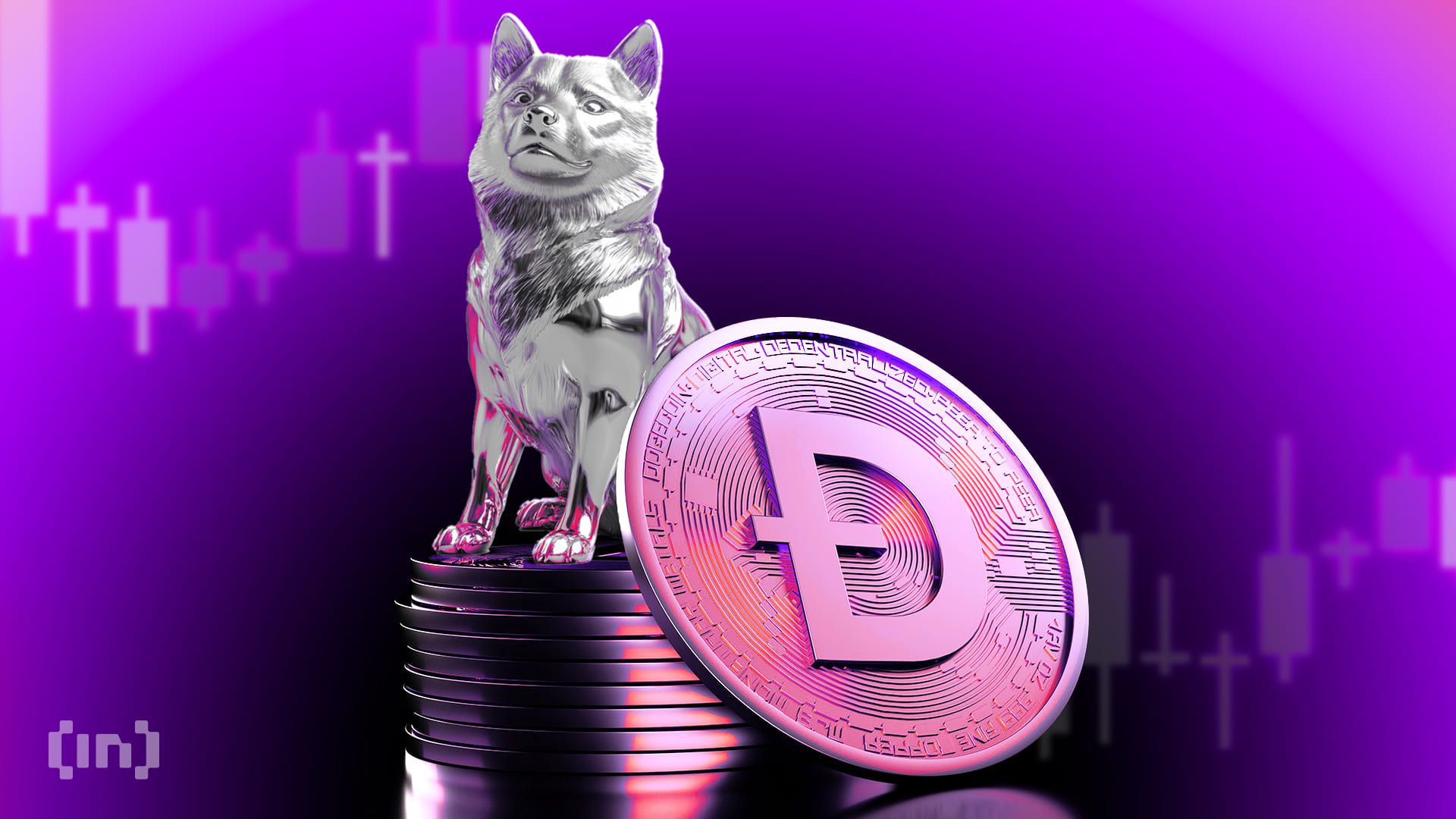
On April 20, Dogecoin enthusiasts worldwide united to mark Dogeday, a community-driven holiday celebrating the world’s most recognizable meme coin.
While the festivities showcased the coin’s loyal fanbase and cultural relevance, the celebration failed to spark any meaningful market movement.
Dogeday Fails to Lift Dogecoin Price as Traders Face $2.8 Million in Liquidations
Instead of riding a wave of positive sentiment, Dogecoin was the worst-performing asset among the top 20 cryptocurrencies during the past day.
According to data from BeInCrypto, the token dropped over 2.5% during the reporting period compared to the muted performance of the general market.
This disappointing performance led to roughly $2.8 million in liquidations, with traders betting on an upward price movement losing more than $2 million, per Coinglass figures.

However, even with the lackluster price action, Dogecoin’s relevance in the crypto ecosystem remains undeniable. Launched in 2013 as a parody of Bitcoin, DOGE has grown far beyond its meme origins.
The digital asset is now the ninth-largest cryptocurrency by market capitalization, currently valued at approximately $22.9 billion, according to CoinMarketCap.
Much of its growth can be attributed to high-profile endorsements. Tesla CEO and presidential advisor Elon Musk has repeatedly voiced support for Dogecoin, as has billionaire entrepreneur Mark Cuban. Their backing helped shift public perception of DOGE from a joke to a legitimate digital asset and payment option.
On social media, Dogecoin continues to lead the memecoin narrative. According to CryptoRank, it was the most mentioned memecoin ticker on X (formerly Twitter) in the past month. This visibility continues to fuel both community engagement and investor interest.
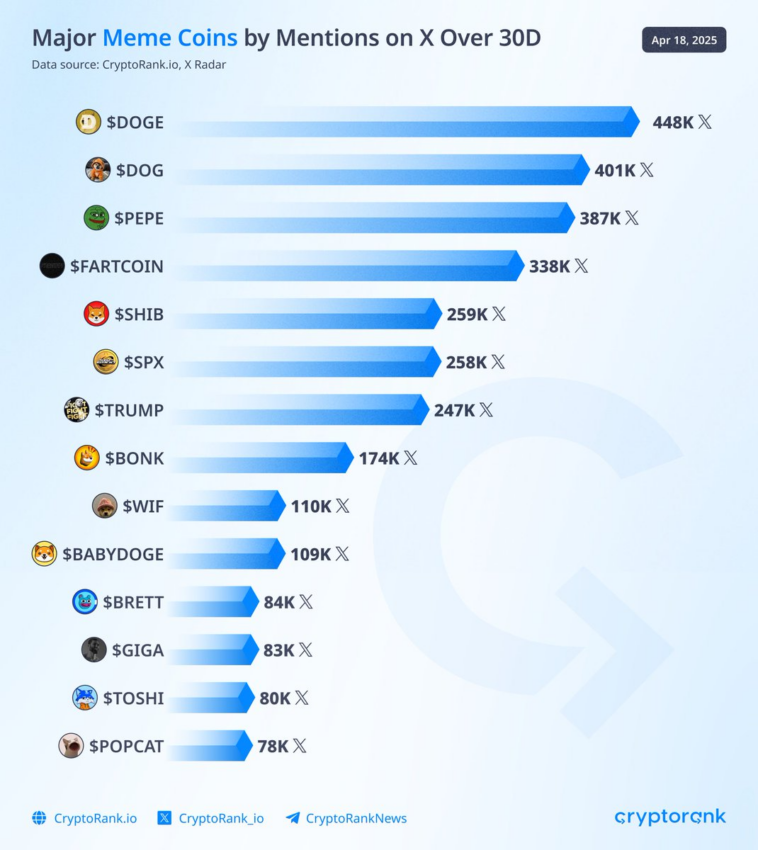
Moreover, institutional interest in Dogecoin is also on the rise. Major asset managers, including Bitwise, Grayscale, 21Shares, and Osprey, have submitted filings to the US Securities and Exchange Commission (SEC) seeking to launch spot Dogecoin ETFs.
If granted, these financial investment vehicles could become the first exchange-traded funds centered entirely on a meme coin.
Considering this, crypto bettors on Polymarket put the odds of these products’ approval above 55% this year. This optimism reflects a growing belief that Dogecoin could soon secure a place in mainstream financial markets.
Disclaimer
In adherence to the Trust Project guidelines, BeInCrypto is committed to unbiased, transparent reporting. This news article aims to provide accurate, timely information. However, readers are advised to verify facts independently and consult with a professional before making any decisions based on this content. Please note that our Terms and Conditions, Privacy Policy, and Disclaimers have been updated.
-

 Altcoin22 hours ago
Altcoin22 hours agoUniswap Founder Urges Ethereum To Pursue Layer 2 Scaling To Compete With Solana
-

 Market18 hours ago
Market18 hours agoToday’s $1K XRP Bag May Become Tomorrow’s Jackpot, Crypto Founder Says
-

 Ethereum18 hours ago
Ethereum18 hours agoEthereum Consolidates In Symmetrical Triangle: Expert Predicts 17% Price Move
-

 Altcoin21 hours ago
Altcoin21 hours agoWhat’s Up With BTC, XRP, ETH?
-

 Market12 hours ago
Market12 hours ago1 Year After Bitcoin Halving: What’s Different This Time?
-

 Market13 hours ago
Market13 hours agoVOXEL Climbs 200% After Suspected Bitget Bot Glitch
-

 Ethereum20 hours ago
Ethereum20 hours agoEthereum Accumulators At A Crucial Moment: ETH Realized Price Tests Make-Or-Break Point
-

 Ethereum17 hours ago
Ethereum17 hours agoEthereum Enters Historic Buy Zone As Price Dips Below Key Level – Insights


